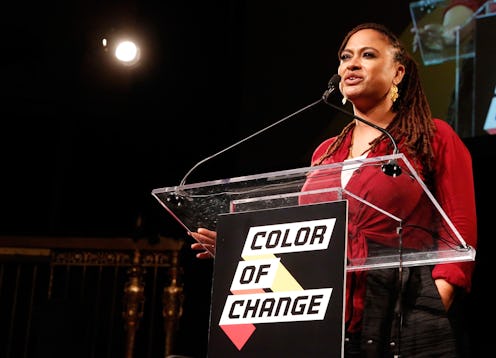Entertainment
Could Investigating Hollywood Really Enact Change?
On Tuesday, it was announced that, in a move many consider a long time coming, the Equal Employment Opportunity Commission will investigate the lack of female directors working in film and TV. As reported by Deadline, the EEOC recently sent a letter out to 50 women working in those fields, encouraging them to share their stories and confidentially report on any gender-based discrimination they may have faced, an act that may potentially lead to a class-action lawsuit against the industry. Considering that women direct only 16 percent of TV episodes and, in 2014, less than five percent of major studio releases, the investigation certainly seems necessary. But will it actually enact change in the way women are treated in Hollywood?
Unfortunately, that's hard to say. The EEOC has taken a significant first step in addressing the problem, if a belated one. Gender discrimination, particularly in Hollywood, is not exactly a new phenomenon. Sexism has existed in the film and TV industries ever since the mediums came into existence. One investigation, for all of its good intentions, is not going to solve that completely. However, that's not to say that the EEOC's actions are meaningless — far from it. In fact, if history shows, the director investigation might actually have a significant impact on the industry.
Take these past investigations into sexism in other industries: In 1970, 46 female Newsweek employees fought their company for its alleged gender discrimination in a groundbreaking lawsuit — the first ever female class-action claim. The suit was successful, and changes were made at Newsweek, albeit slowly; over time, the magazine began hiring more women as writers and editors, and it added the company's first female senior editor. It took an additional lawsuit in 1972 for Newsweek to fully comply with the plaintiff's demands, but eventually, significant process was made.
And in 2013, female brokers sued Bank of America, claiming that they were paid less than their male counterparts and not given a fair amount of accounts. They won the suit, and the bank paid $39 million in a settlement that affected about 4,800 female employees. Back in 2003, Abercrombie and Fitch was sued for discriminating against women and minorities in recruiting, hiring, and marketing; the company paid a $50 million settlement, and was required to institute policies to promote diversity and prevent discrimination based on race and gender.
As these suits and others have proven, change can be made when it comes to gender discrimination — but perhaps it might be easier outside of Hollywood. In 1983, the Directors Guild of America, on behalf of female and minority directors, sued Warner Bros. and Columbia. The case was dismissed, but the number of female directors working in Hollywood did increase after the lawsuit, if only for a time. And The Week reports that a few years earlier, in 1978, a report was released to the U.S. Commission on Civil Rights revealing that in the 1960s, the Department of Justice had found that the film industry violated the Civil Rights Act of 1964 — but when Hollywood organizations denied it, they settled and avoided a lawsuit. Sadly, the 1978 report stated that despite the settlement including provisions to create equal opportunities, nothing was enforced, and gender discrimination stayed prevalent.
Some lawsuits have effects that are less clear, though. In 2011, 1.6 million former and current female Walmart employees sued the company for gender discrimination in a class-action lawsuit. It was the largest workplace bias case in history. Although the court denied the class action, they allowed the women to pursue individual claims against Walmart if they wished. Yet the court's decision was monumental; since the Walmart ruling, fewer employee discrimination class actions are being filed, according to Jocelyn Larkin, executive director of the Impact Fund. She told ProPublica that prior to the Walmart case, there were 25-30 discrimination cases each year; after, only 10-12.
That's a frustrating result. Are women not coming forward with their tales of alleged discrimination, and are lawyers not representing them? There's little question that sexism is prevalent in industries far and wide, and it's disappointing that the failure of one class-action suit seemingly means that victims of discrimination are less likely to win their battles, or even get the chance to fight.
But on the other hand, it only makes the EEOC's investigation all the more important. If it leads to a class-action suit, as it undoubtedly could, and if that suit wins, its effects would be greater than just within the entertainment industry. If Hollywood was forced to pay for discriminating against its female directors, employees facing sexism in other industries might see a real chance to get their voices heard, and choose to take a stand. So while it's far too soon to know for sure what the specific effects of the EEOC investigation will be, it's clear that if it does go to court, the results could potentially be huge. This case could affect women in Hollywood, yes, but also those in the countless industries outside of it.
